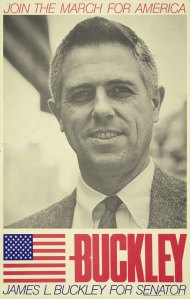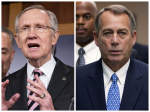Sen. James L. Buckley titled his 2006 oral history, “Gleanings from an Unplanned Life.” Unplanned as it may have been, the older brother of the late William F. Buckley Jr. spent a life in public service promoting individual liberty. He served six years as a U.S. senator from New York, elected from the Conservative Party. He sat for 11 years on the bench of the U.S. Court of Appeals for the District of Columbia and was appointed to several posts in the Reagan Administration. He also served in the Navy during World War II and earned degrees from Yale, where he was a member of the Skull and Bones society.
Videos by Rare
Much like his brother, Sen. Buckley represents an era of conservatism and political discourse that is rare in today’s society. He is an academic and an intellect, an orator and a sailor, a thinker and a scholar. He’s the uncle of influential conservatives Christopher Buckley, Brent Bozell and William F.B. O’Reilly.
We reached Buckley on Monday by phone at his home in Sharon, Conn. This is Part 3 of our conversation. Part 1 focused on the state of the Republican party. Part 2 featured Sen. Buckley’s thoughts on the legacy of President Obama, Hilary Clinton and the future of the GOP.
Douglas Barclay: Can you speak to the diminished role of the Catholic Church on our national discourse?
Sen. James L. Buckley: I never thought that the Catholic Church as being involved in politics. I objected to the Conference of Catholic Bishops intoning to this, that, and the other issue to being beyond their competence. The church can preach morality, right and wrong, individual responsibility and so on, but deciding how this involves politics is beyond their métier.
Barclay: What are your thoughts on Obamacare?
Buckley: There have been encroachments on religious freedom generally in recent times — of course, most recently, in the mandate under Obamacare — that people of faith, fund and pay for insurance policies for employees, that cover expenditures that violate their conscious. I think that is separate from a Catholic issue, I think that is a basic religious-rights issue.
Barclay: It has been argued that if JFK ran in today’s society, he would be considered a conservative. There is a new book out, “JFK Conservative,” that speaks to that. Given your experience, would you agree with that notion?
Buckley: In the area of fiscal policy, that is true. He is the one who instituted a significant cut in tax rates on the understanding that high tax rates discourage investments and the creation of new opportunities for employment. Socially, I just don’t know how we can second-guess it at this stage. My guess is that, unlike his two brothers, he was instinctively more cautious about having government dictate to individuals and how they should behave.
Barclay: You have spoken out in the past about the danger and phenomenon behind government leaks. Are you surprised that someone like Edward Snowden has reached an almost folk-hero-like status in some circles?
Buckley: I’m distressed by it. I am distressed. Unfortunately, though, he touched a real nerve — when you learn about the extraordinary capabilities that the NSA has been able to achieve, and examples of the abuse of bureaucratic power with the IRS scandals and others of recent times. I think he has touched on a real nerve, one that I think should be paid attention to. I have never condoned the idea that someone should be made a hero when he violates a sacred responsibility — that secrets should remain a secret.
Barclay: What are your thoughts on the recent shutdown of the federal government?
Buckley: I introduced an amendment once to do away with debt limits; it didn’t get anywhere. In my time, [getting close to a shutdown] resulted in a way in which people tried to attach new legislative proposals to an item of legislation that had to be adopted because the faith and credibility of the United States depended on it. So, a lot of mischief was being done but there was never a shutdown
Barclay: Did you feel that the Republicans ever had a chance in 2008 and 2012?
Buckley: I think that they were two weak candidates. They themselves did not have the clarity of vision as to what the problems are we face in order to explain, persuasively, why their view appropriate policy for the Republic is a proper one. When McCain was running, the true character of Obama was not as clear as it is now. He was able to pawn himself off as someone who was a little moderate, who was able to listen to both sides, etc. Though I think that an examination of the people he was associated with should have alerted people to the fact that he was truly radical in the American sense.
Related articles
- BUCKLEY SPEAKS (Part 1): Nation’s last third-party senator on the chances of a third party today (rare.go-vip.net)
- BUCKLEY SPEAKS: (Part 2) Conservative icon on how Barack Obama has damaged the US, and why the GOP may fail in 2016 (rare.go-vip.net)
- What would Buckley think? (rare.go-vip.net)
- Remembering William F. Buckley Jr: What would he say today? (rare.go-vip.net)
- What Would Buckley Do? (hennessysview.com)




